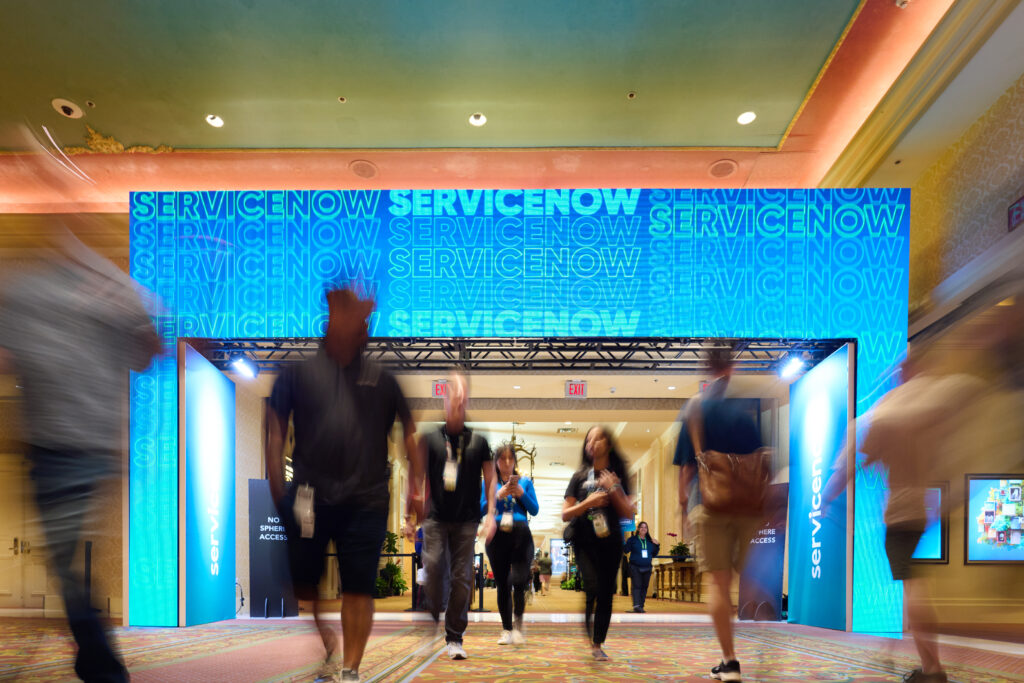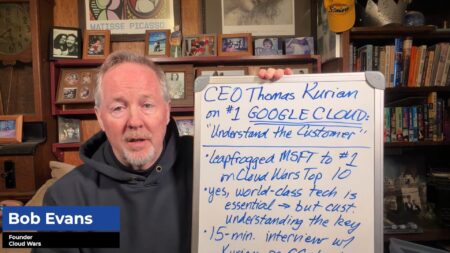
No less of a tech-industry visionary than NVIDIA CEO Jensen Huang refers to the ServiceNow platform as the “operating system of the enterprise,” as he did again last week at ServiceNow Knowledge25.
At the same time that ServiceNow gains this level visibility, its flagship platform is gaining critical functionality via acquisition, partnership, and internal development. Collectively, the new developments add data management and integration with third-party enterprise systems that are required in the AI era.
At last week’s Knowedge25, Huang made his annual appearance during ServiceNow CEO Bill McDermott’s keynote and shared insights into the companies’ partnership, as well as NVIDIA’s own use of the platform.
“As a third party watching the world of enterprise AI, ServiceNow is destined to be the operating system of the enterprise,” he said. “The reason for that is because every company in the world needs AI agents and those AI agents are going to be curated, managed and made better by the IT department. And ServiceNow is already in every company’s IT department.”
In this analysis, I’ll review steps the company took at last week’s Knowledge25 conference to deliver on the concept of the “operating system of the enterprise” or, as ServiceNow CEO Bill McDermott labeled the platform, an enterprise’s “central nervous system.”
Data.world Acquisition
ServiceNow announced that it’s acquiring data.world, a leader in enterprise data cataloging and governance that will expand the capabilities of its Workflow Data Fabric management platform.
Data.world’s platform will allow customers to enrich data with meaning, context, and relationships — all while supporting AI agents and workflows.
Data.world supports functions including pinpointing a correct data source and connecting it with required people and processes, helping to make a corporate data estate AI-ready. That’s vital because data readiness is frequently cited as one of the largest hurdles to successful AI implementations.
The combination of ServiceNow and data.world technology will enable organizations to govern and orchestrate the entire lifecycle of their data from a single platform. ServiceNow said data.world will “supercharge” Workflow Data Fabric and give every AI agent and workflow the context it needs to drive smarter, faster outcomes.
The data.world acquisition comes on the heels of ServiceNow’s acquisition of Moveworks, which develops enterprise-focused automation and AI tools, for $2.85 billion. Terms of the data.world acquisition weren’t disclosed.
Data Management Ecosystem
ServiceNow also took major steps forward with an ecosystem approach to providing connections from third-party enterprise systems into the ServiceNow platform. An overriding goal: reduce and eliminate silos so that data can be shared and AI agents can interoperate easily.
I previously provided details on the new Workflow Data Network, which the company describes as uniting data platforms, applications and open-source tools to drive AI-powered insights on the ServiceNow platform.
At Knowledge25, ServiceNow filled in additional details on the partner relationships and the data-sharing functionality in development:
- Zero Copy connectors to Amazon’s AWS Redshift, Google Cloud BigQuery, Databricks, Microsoft SQL Server, Oracle, Snowflake, Cloudera, and Teradata. (Additional detail on AWS and Google Cloud below.)
- Partnerships with Adobe, Boomi, Microsoft and Oracle to integrate preferred applications and pre-built templates directly into the ServiceNow AI platform. These integrations will accelerate workflow automations across departments and functions.
- Connections to RaptorDB Pro and over 50 open-source databases, an approach that lets enterprises select, or continue to use, the data platform of their choice.
ServiceNow has developed new integration with AWS, the largest of the cloud hyperscalers. Customers can bring Amazon Redshift data into ServiceNow to enrich workflows and decision‑making, while also integrating ServiceNow data into AWS for advanced analytics, machine learning (ML), and deeper insights. The innovation also accelerates the flow of AWS data — including anomaly detection, predictive analytics, and risk alerts — to automatically trigger ServiceNow workflows.
Google Cloud CEO Thomas Kurian, speaking remotely at the Knowledge conference, said his firm and ServiceNow have a shared version of agentic AI across platforms, and that is driving their partnership in relation to the Workflow Data Network.
NVIDIA detailed a new data partnership that expands the footprint of ServiceNow and adds momentum to the “enterprise operating system” positioning by Huang.
The companies said they are integrating NVIDIA NeMo microservices into the ServiceNow Workflow Data Fabric, which underpins the Workflow Data Network. This curates and contextualizes enterprise workflow data to refine and optimize AI reasoning models, with guardrails in place to help ensure that customers are in control of how their data is used in a secure and compliant manner. The result: a closed‑loop learning process for strong model accuracy and adaptability — accelerating the development and deployment of personalized, context‑aware AI agents designed to enhance enterprise productivity.
New Products Expand Data and AI Footprint
A core element of expanded support for third-party data is the ServiceNow AI Agent Fabric and AI Control Tower.
AI Agent Fabric provides connectivity between agents to work together across tools, teams, and vendors including Microsoft, NVIDIA, Google, Oracle, and more. AI Control Tower is a centralized command center to govern, manage, secure, and realize value from any ServiceNow or third-party agent, model, or workflow.
The company also made significant additions to its AI Agent Lineup including:
- Agents that advance companies’ ability to manage IT autonomously, including agents for IT Service Management, IT Operations Management, IT Asset Management, and Strategic Portfolio Management.
- IT security agents designed to improve consistency, identify insights, and reduce response times. New security-focused partnerships with Microsoft and Cisco help IT orgs accelerate the shift from reactive defense to autonomous resilience, providing organizations with robust, efficient, and ethical solutions.
CPrime, a ServiceNow partner, noted that organizational silos go a long way toward impeding AI advances, and ServiceNow’s moves to operate across silos and systems are a big plus for customers while enabling the enterprise OS functionality. “We actually believe that of the large tech players out there, the SaaS companies, ServiceNow is the only one that can actually unlock flow. They’re the only ones that can actually operate across the enterprise. We think that becoming the operating system is their destiny,” said Matt Robinett, vice president, experience and growth at CPrime.
Last week’s products, partnerships, and acquisition accelerate the company’s progress down that path.

Ask Cloud Wars AI Agent about this analysis










